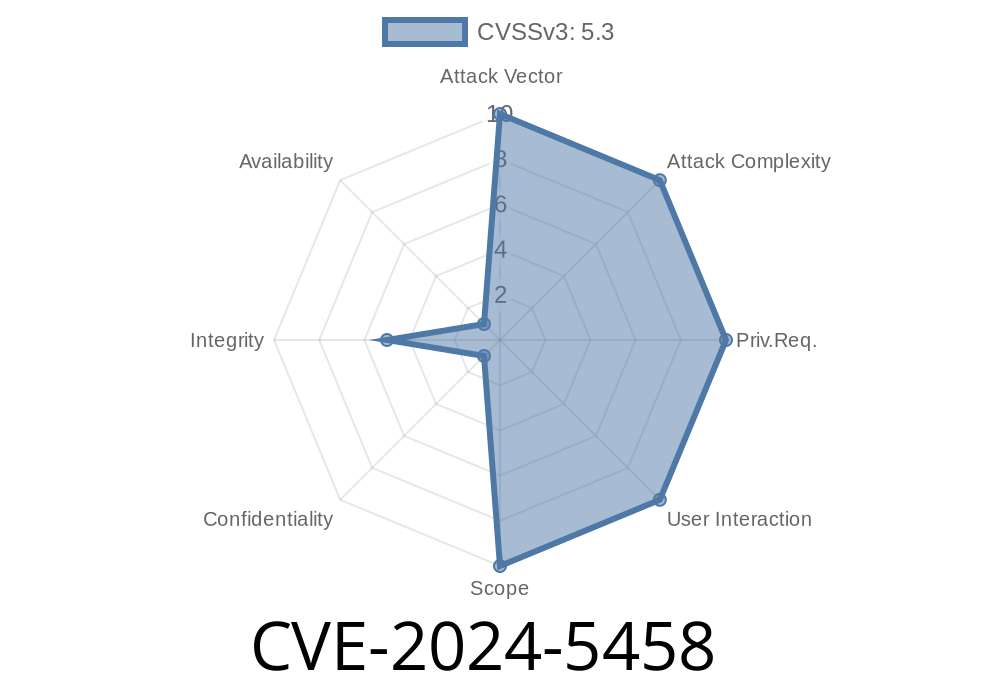PHP is one of the main programming languages used to create dynamic websites and web applications. Its powerful functions—like filter_var()—help developers validate data easily and securely. But sometimes, even widely used tools like this can introduce subtle vulnerabilities. That’s exactly the case with CVE-2024-5458, a security issue found in filter_var() when using the FILTER_VALIDATE_URL option. Here’s what happened, why it’s important, and how an attacker might exploit it.
What is CVE-2024-5458?
CVE-2024-5458 refers to a serious bug in PHP’s core code affecting how URLs are validated. If you use PHP versions:
8.3. through 8.3.7
then your application is affected by this bug. The vulnerability arises from a logic error in URL filtering functions—especially filter_var() with FILTER_VALIDATE_URL. Under certain conditions, it causes the function to treat invalid user information (the username:password part of a URL) as valid.
Why is this bad?
If your application relies on filter_var() to check if a URL is safe, your code may wrongly accept "bad" URLs. Later, when your app parses these URLs, you could end up with unexpected values—or even open doors for attackers.
Let’s break it down. The structure of a URL can look like this
scheme://user:pass@host/path
To verify if something is a “real” URL, developers often use this code
$url = $_GET['url'];
if (filter_var($url, FILTER_VALIDATE_URL)) {
// This is a valid URL. Proceed to use it.
}
But due to this bug, certain invalid user info in the URL passes the validation. For example, a user might submit:
http://invalid_user!@example.com/
*The exclamation mark (!) is not allowed in the username part of a URL.*
Before this bug was fixed, filter_var() would return TRUE—treating the URL as valid. This means code downstream may process this user info, store it, or even try to use it in requests, leading to:
Here’s a quick demonstration. Suppose a vulnerable PHP script
$url = $_GET['url'] ?? '';
if (filter_var($url, FILTER_VALIDATE_URL)) {
echo "URL is valid: " . htmlspecialchars($url);
} else {
echo "URL is invalid.";
}
Valid URL:
http://user:pass@example.com/
— Output: URL is valid: http://user:pass@example.com/
Invalid but 'accepted' URL (exploits the bug):
http://invalid_user!@example.com/
— Output *should* be: URL is invalid.
— Actual output (before patch): URL is valid: http://invalid_user!@example.com/
> Note: The ! character is not supposed to be part of the user field in a valid URL, but due to the bug, filter_var() says it is.
PHP 8.3.8
See the official PHP changelog entry here
Upgrade your PHP version to at least 8.1.29, 8.2.20, or 8.3.8.
- Until you can upgrade, avoid relying solely on filter_var() for sensitive URL validation. Consider extra checks, or use more robust libraries (like league/uri) for URL validation and parsing.
Original References
- PHP GitHub Commit Fixing the Issue
- Red Hat CVE Record
- PHP Release Announcement with Fix
Conclusion
This vulnerability might look minor, but data validation is the bedrock of security for every application. When an underlying filter lets malformed values through, it can affect all layers of your code, leading to unpredictable issues and real security risks. Always keep dependencies up-to-date, and never trust user-supplied data—even if it “looks” validated.
Are you using filter_var(FILTER_VALIDATE_URL)?
Check your PHP version today and upgrade if necessary!
Timeline
Published on: 06/09/2024 19:15:52 UTC
Last modified on: 06/18/2024 10:15:10 UTC
